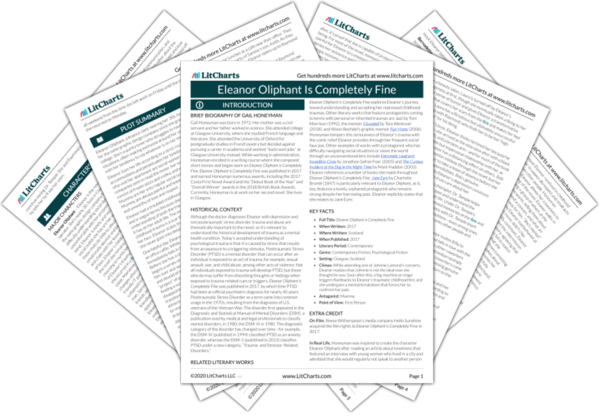Fire symbolizes Eleanor’s past. At the literal level, fire reminds Eleanor of her mother’s final act of violence against Eleanor and her sister, Marianne. When Eleanor was 10 years old, Mummy set fire to their house in an effort to kill Eleanor and Marianne, whom she considered inconveniences to her preferred, carefree lifestyle. Eleanor survived this act of violence, but Mummy and Marianne perished in the fire. Years later, Eleanor is wracked by guilt because she wasn’t able to protect her sister from Mummy or save her from the fire. Whenever Eleanor thinks about fire, she is thinking about this traumatic, definitive moment of her childhood. For this reason, Eleanor regards all things associated with fire—such as the smoke machine at Johnnie Lomond’s second gig, or Raymond’s cigarette smoking—with disgust and disdain.
Fire also symbolizes Eleanor’s inability to think about her past in direct, concrete terms. It’s too painful for Eleanor to confront her mother’s cruelty, her sister’s death, or her own grief directly, so she uses vague or opaque referents to think about her past and discuss it with others. When Eleanor tells Raymond how she got her scar, for example, she simply tells him she got it in a fire. This explanation spares Eleanor the harder work of admitting to Raymond—and to herself—the painful details connected to the fire, such as Mummy’s abuse, Marianne’s death, and her own grief.
Fire Quotes in Eleanor Oliphant Is Completely Fine
Jane Eyre. A strange child, difficult to love. A lonely only child. She’s left to deal with so much pain at such a young age—the aftermath of death, the absence of love. It’s Mr. Rochester who gets burned in the end. I know how that feels. All of it.
Even the circus freak side of my face—my damaged half—was better than the alternative, which would have meant death by fire. I didn’t burn to ashes. I emerged from the flames like a little phoenix. I ran my fingers over the scar tissue, caressing the contours. I didn’t burn, Mummy, I thought. I walked through the fire and I lived. There are scars on my heart, just as thick, as disfiguring as those on my face. I know they’re there. I hope some undamaged tissue remains, a patch through which love can come in and flow out. I hope.
I smiled at her. Twice in one day, to be the recipient of thanks and warm regard! I would never have suspected that small deeds could elicit such genuine, generous responses. I felt a little glow inside—not a blaze, more like a small, steady candle.
“But you’re not smart, Eleanor. You’re someone who lets people down. Someone who can’t be trusted. Someone who failed. Oh yes, I know exactly what you are. And I know how you’ll end up. Listen, the past isn’t over. The past is a living thing. Those lovely scars of yours—they’re from the past, aren’t they? And yet they still live on your plain little face. Do they still hurt?”
Polly the plant had died that morning. I’m fully aware of how ridiculous that sounds. That plant, though, was the only living link with my childhood, the only constant between life before and after the fire, the only thing, apart from me, that had survived. I’d thought it was indestructible, assumed it would just go on and on, leaves falling off, new ones growing to replace them. I’d neglected my duties these last few weeks, too busy with hospitals and funerals and Facebook to water her regularly. Yet another living thing I’d failed to look after. I wasn’t fit to care for anyone, anything. Too numb to cry, I dropped the plant into the bin, pot, soil and all, and saw that, throughout all these years, it had been clinging on to life only by the slenderest, frailest of roots.
These days, loneliness is the new cancer—a shameful, embarrassing thing, brought upon yourself in some obscure way. A fearful, incurable thing, so horrifying that you dare not mention it; other people don’t want to hear the word spoken aloud for fear that they might too be afflicted, or that it might tempt fate into visiting a similar horror upon them.












